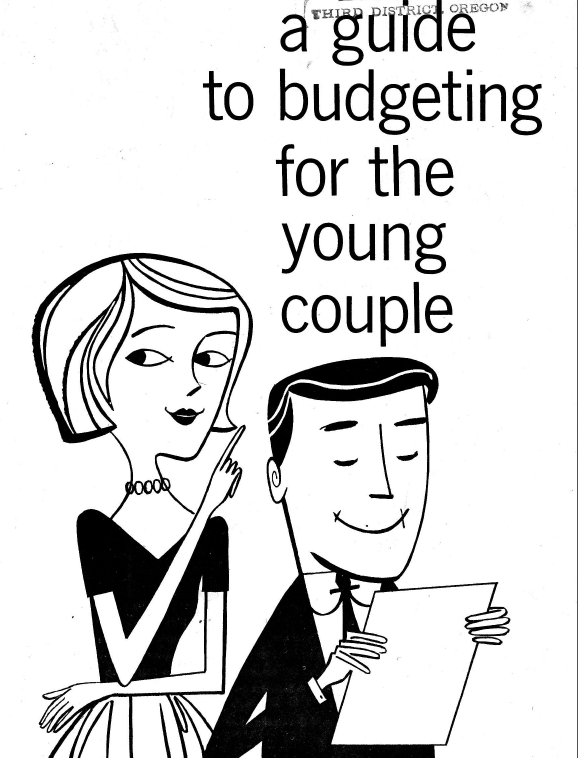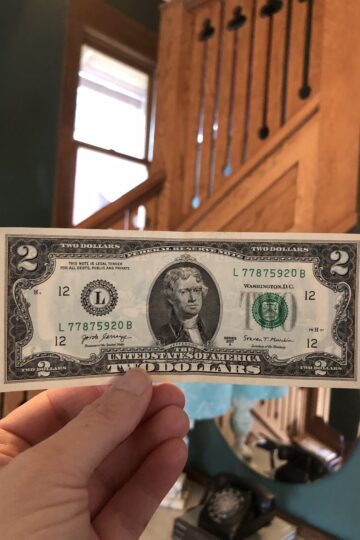Learn to Budget From a 1964 Pamphlet

The following blog post first appeared over at ClarkHoward.com.
My sister is an illustrator and collects vintage graphics, irregardless of the subject matter, so when I spied her 1964 U.S. Department of Agriculture pamphlet titled "A Guide to Budgeting for the Young Couple" I stole it in the name of personal finance writers throughout the land. I immediately dove in, thinking I could glean some entertainingly outdated information. Instead, I was struck by how the 52-year-old information was as relevant today as ever. Yes, the language and a couple of tips felt out of place, but a quick edit and new graphics would make this 52-year-old pamphlet relevant for today's budget challenged consumer.
The nine page booklet starts out with an explanation of what a budget is, and why "young married couples" needs one.
"If you are a young married couple who want to make a good start in managing your finances, this publication can be of help to you. Here you'll find the basic steps setting up and using a simple workable budget-one evolved from your own experience, tailored to your income and situation, and geared to your individual goals. Budgeting doesn't mean that you will be pinching pennies and neatly recording how you spent every one, but it does mean that you will."
- Make money management a joint venture from the start.
- Face money matters frankly and get problems down on paper.
- Consider each other's wishes.
- Agree on a realistic spending plan.
- Stick to budgeting until your plan works.
- Adjust the plan as your circumstances change.
Money management as a deliberate and shared goal? Nothing outdated about that!
I'm the first to admit that the pamphlet takes a paternalistic tone, and you can almost imagine a Mad Men era (pipe optional) father sitting the impressionable young couple down for a financial lesson:
"If you look about you, You'll notice some young couples seem to have the knack of making ends meet, while others, in the same circumstances, are already carrying heavy debt loads and are often pinched for money. The difference is that some couples are better managers of their resources -they have learned the value of planning. There's no doubt about it - making and carrying out a spending plan does help. To make a plan, you have to sit down together to talk realistically about money, face facts, and work out any differences you may have about how your income is to be used."
Essentially, live within your means, communicate and then plan out how to spend based on your actual income. Good advice, dad.
Of course, there are laughable bits, such as "Figures show how couples at two income levels (one under, the other over, $5,000) divided their income." Umm . . . there ain't no 2016 budget that's going to help adult couples earning less than $5000 per year. That 1964 math simply doesn't translate to 2016. Not even slightly!
Setting both short and long term goals is almost identical to current day advice:
"The more specific you are about your immediate and long-time goals, the better. One goal for the first year or any year is, of course, to live comfortably. Other first-year goals might be: Meet the costs for a final year in college ... start saving for a better car ... buy a chest of drawers. A 5-year goal might be to accumulate a down payment on a house of your own or to begin a family."
This is very similar to a ClarkHoward.com piece from contributor Jacob Wade:
"Pick 3 dreams of yours and write them down. Those dreams usually will need funding, so now just work backwards and see what financial milestones you need to hit in order to realize those dreams. Have a sunny beach in mind? Set up a vacation savings fund. $200 a month, and BOOM!, in 6 months you'll have over $1,000 put away for a nice fall getaway!"
Looking for specific ways to decrease your expenses? 1964 has got you covered!
"To reduce flexible expenses you might"
- Eliminate some items altogether, for the time being at least.
- Spend less for certain items (cut down on cigarettes or pay less for a spring coat).
- Make use of your own skills instead of paying for services (make the cafe curtains you want instead of buying them, wash your car, etc.).
- Take your lunch from home instead of buying it.
- Take advantage of free community services for education and recreation (concerts, parks, libraries, lectures, recreational centers, art exhibits).
With the exception of "cut down on cigarettes" this advice is as timely as ever.
Think that an emergency fund is a new concept? Wrong!
"If you possibly can do so start to build up an emergency fund. There are bound to be extras that come up at the most unexpected times-like the car battery that has to be replaced the last day of the month, or the unannounced guests who arrive when the grocery budget is at low ebb."
The most obvious difference between 1964 and 2016 budgeting is the advent of internet based programs. It's no longer necessary to "carry a little pocket notebook in which each of you jot down expenditures" when Every Dollar, You Need a Budget, and Mint make budgeting simple and easy. Whether you budget on your phone or laptop, 2016 wins this round.
The "Guide to Budgeting for The Young Couple" is an amazing resource, despite some outdated language and assumptions. (Yup, that "young couple" is husband and wife, and absolutely not cohabitating without a marriage license!)
It turns out that budgeting is pretty timeless. Spend less than you earn, plan your expenditures and enjoy the process.
"You would like to get into the habit of saving as soon as possible. Saving together can be almost as much fun as spending together, once you accept the idea that saving money is not punishment, but a systematic, planned way of reaching goals and ambitions. You do without little things now in anticipation of buying what will give you greater satisfaction later."
Yes, fun. "Saving together can be almost as much fun as spending together." Something we need bit more of in 2016. Those 1964 couples sure knew how to party budget!
Katy Wolk-Stanley


This is so cute! I was nervous that there was going to be a lot of outdated gender role suggestions, but I'm surprised how timely this piece actually is. 🙂 I guess good sense with money is timeless, regardless of what you buy and your personal situation.
Very cool!
My Aunt was married that year and one of her wedding gifts was a cookbook called "Cooking for Two". She gave me that cook book when I got married in 1975. It was awesome! It had a lot of recipes and food budget suggestions. I wish I could find it now. I loved that book.
Thanks for sharing, Katy. 🙂
Hey, I got that book when first married in 1963 and used it for years! I still have it -- it's called Betty Crocker's Dinner for Two Cook Book, so maybe it's not the same.
I love those old booklets. I have the manual for my late M-I-L's 1960's Electrolux canister vacuum with "new! retractable cord and power head" -- it's so quaint. The old turquoise vacuum that it came with is long gone, but the manual lives on!
Good advice is timeless, which is why Proverbs is still a good read. I wish I'd had that budget booklet in 1979! Talk about two people with no clue..... that was us.
We had that exact Electrolux vacuum when I was growing up! It could sure suck up the dirt, but doing the stairs was a chore. Can you say "heavy"??
My husband used to ride the canister as a kid. It was solid metal, built like a tank. Yes, HEAVY! I used it for a number of years before it died.